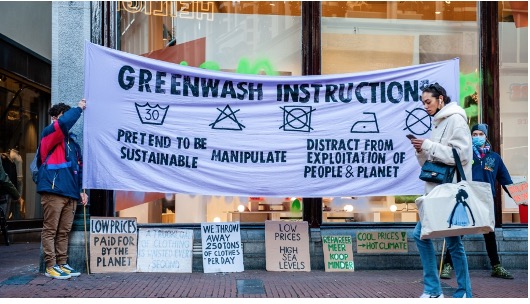Comments
PLANNING WATCH - As I wrote last week, according to the UN’s Intergovernmental Panel on Climate Change (IPCC), global climate disruption will soon reach the point of no return. While this ominous report grabbed a few headlines, most people already knew that record heat waves, droughts, storms, and floods are making their lives considerably worse.
Amidst this bad news, at least one group, major real estate investors, realize that the climate crisis creates enormous opportunities. They only need to claim that their speculative projects are climate friendly, hoping that public agencies and climate activists believe their greenwashing or keep their doubts under wraps.
These deliberate greenwashing deceptions may, however, become harder to foist on the public because of three proposed California laws: Senator Henry Stern’s Climate-Related Financial Risk Act; Senator Lena Gonzales Fossil Fuel Divestment Act; and Senator Scott Wiener’s Climate Corporate Data Accountability Act.
If adopted and then signed by Governor Gavin Newsom, this legislation requires California companies with $1 billion or more in annual sales to calculate and share data on their Greenhouse Gas emissions. The goal is to prevent them from greenwashing their real estate projects.
Is there a catch since one of the sponsors is State Senator Scott Wiener, a tireless advocate of state laws that deregulate local land use ordinances, justified by the data-free claim that new, expensive apartments reduce homelessness.
The answer is yes, there is a catch. The Achilles Heel of these proposed laws is their weak enforcement. Violators are only subject to civil actions -- most likely fines -- initiated by California’s State Attorney General. Corporate polluters need not worry about Highway Patrol or police sting operations that lead to long prison sentences. Legislators, law enforcement, and the judiciary give white collar criminals tremendous leeway. Even though the total annual cost of white collar crimes, such as the release of dangerous chemicals (e.g. Greenhouse Gases) into the atmosphere, is between $426 billion to $1.4 trillion, few white collar crimes are ever prosecuted. In comparison, the cost of street crimes is only $15 billion per year, yet they are responsible for most of the two million people incarcerated in the United States. In the rare cases when a judge sentences a white collar criminal, imprisonment is measured in months, not years.
To make this discussion of proposed anti-greenwashing laws, like Senator Wiener’s, more understandable, we need to examine another proposed law, Assembly Bill 68, which streamlines local housing approvals. This law is greenwashing in action since it exempts local housing projects from the California Environmental Quality Act (CEQA).

A recent LA Times puff piece praising this proposed legislation relies on three lies to conceal the greenwashing.
Lie #1 - California must add 2.5 million homes by 2030. California’s housing shortage only applies to low cost affordable housing, and for the minority with high incomes, there is no shortage of expensive homes and apartments they can buy or lease. The 2.5 million figure comes from the industry-funded Turner Center, and the Palo Alto-based Embarcadero Institute has been totally debunked it.
Lie #2 - The housing shortage is driven by local policies that prevent new housing from being built in existing neighborhoods. This is totally incorrect because:
- Every house in California is entitled to three Accessory Dwelling Units.
- Senate Bill 9, the California Home Act, allows California homeowners or contractors to subdivide a house’s underlying lot, demolish the existing house, and then build two duplexes.
- In Los Angeles, California’s largest city, large apartment buildings are allowed on all commercial lots, and these exist in every neighborhood, including on hundreds of miles of mass transit corridors.
- In Los Angeles, the Transit Oriented Communities ordinance allows developers extra height and density in exchange for the inclusion of low-priced rental units for low-income tenants, a condition which is never enforced through on-site verification.
Lie # 3 - The LAT puff piece promoting this greenwashing legislation ignores the following:
- AB 68 contains a provision that exempts new real estate projects from the California Environmental Quality Act, California’s best tool for measuring a project’s climate impacts.
- The proposed legislation contains no monitoring provisions to determine if the new housing it promotes is built and if it reduces the Greenhouse Gas emissions responsible for the climate crisis.
- The proposed “streamlining” legislation is not linked to cities and counties first adopting the legally required General Plan Environmental Justice Element or a voluntary Climate Change element, such as San Jose’s.
The sad reality is that the new, high-end housing that Senator Wiener and his cronies promote, and that are further encouraged by AB 68, are only rentable to the extremely well off. Even when these apartments are near bus stops and rail stations, the tenants still own and drive cars. They rarely take transit, and their reliance on cars negates the alleged climate benefits of these projects. This is greenwashing in action, and the profitability of these projects is worth far more than an occasional fine.
(Dick Platkin is a retired Los Angeles city planner who analyzes local planning issues for CityWatchLA. He is a board member of United Neighborhoods for Los Angeles (UN4LA). Previous Planning Watch columns are available at the CityWatchLA archives. Please send questions and corrections to rhplatkin@gmail.com.)
















